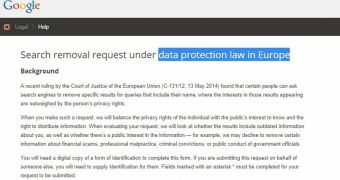Google, Microsoft, and other search engines, will meet with the European Union data regulators to discuss the controversial “right to be forgotten.”
As you may know, the Court of Justice in the European Union ruled a few months back that the search engines would need to allow users to simply have links that are no longer relevant removed from search results pages.
This, as many have said, goes against the world’s “right to know,” their right to access information. Furthermore, the move is rather pointless since the information doesn’t just vanish because the link is removed from search engines.
In fact, the information is still very much out there, and people can find it not only by visiting the original sites whose links were taken down, but also by looking outside the EU borders.
Visiting Google.com, for instance, instead of the localized version, will display the full range of links, including those that have been hidden from the eyes of the European users. Pair this with the fact that Google pages display a notification about removed links and with the fact that news outlets tell the world when some of their links are down, you have a completely useless decision that affects millions of people.
While Google isn’t the only search engine used in the European Union, it does handle over 90 percent of queries performed in the area. The company has received tens of thousands of requests, including from criminals and politicians looking to have their slates cleaned. Google has made it clear from the start that there are links that will, under no form, be removed, such as those leading towards criminal issues, pedophilia, financial fraud, professional malpraxis and so on.
The meeting is scheduled for today, so it is quite likely that the contents of the discussion will make their way to us in the next few days. It is known that the discussion will be focused on the Right to be forgotten ruling and how this is best to handle the situation.
“The precise methods of exercising this right to be forgotten as well as search engines’ potential refusals to execute this right were also studied in an in-depth manner. This discussion led, amongst other things, to the highlighting that in order to effectively exercise this right, it is necessary for individuals to understand thoroughly the precise reasons a search engine, subject to European Union law, can legally refuse this right. The data protection authorities also addressed the criteria allowing totake into consideration, in certain cases, the public interest in accessing the said information,” the data protection authority said.

 14 DAY TRIAL //
14 DAY TRIAL //